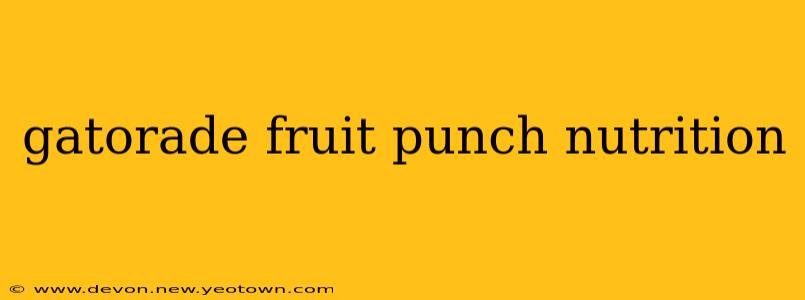Ah, the sweet taste of victory…or maybe just the sweet taste of Gatorade Fruit Punch on a hot day. This vibrant, fruity beverage has been a staple for athletes and everyday folks alike for decades. But beyond the refreshing flavor, what's actually in that bottle? Let's dive into the nutritional details of Gatorade Fruit Punch and explore some frequently asked questions.
What are the main ingredients in Gatorade Fruit Punch?
Gatorade Fruit Punch, like other Gatorade flavors, is primarily designed to replenish electrolytes and carbohydrates lost during physical activity. The exact ingredient list can vary slightly depending on the region and specific product formulation, but the core components usually include water, sugar, citric acid (for that tangy punch!), natural and artificial flavors, salt, and a blend of electrolytes like sodium, potassium, and chloride. You'll also often find artificial colors and preservatives to maintain the product's shelf life and vibrant color.
How many calories are in a bottle of Gatorade Fruit Punch?
This is a crucial question for those watching their calorie intake. A standard 20-ounce bottle of Gatorade Fruit Punch typically contains around 200-210 calories. This calorie count stems largely from the sugar content. While the sugars help replenish energy stores, it's something to keep in mind if you're counting calories or following a specific diet.
What are the electrolytes in Gatorade Fruit Punch, and why are they important?
Gatorade's strength lies in its electrolyte replenishment. Electrolytes, including sodium, potassium, and chloride, are essential minerals lost through sweat during exercise. These minerals play vital roles in muscle function, hydration, and nerve transmission. By replenishing these electrolytes, Gatorade aids in preventing muscle cramps, fatigue, and dehydration, particularly during or after intense physical activity.
Is Gatorade Fruit Punch good for hydration?
While Gatorade Fruit Punch can contribute to hydration, it's not a perfect substitute for plain water. The sugar content, while providing energy, can actually slow down the absorption of water into your body compared to plain water. It's best to use Gatorade Fruit Punch strategically, especially during or immediately after intense exercise, when electrolyte replenishment is crucial. For everyday hydration, plain water remains the best choice.
Does Gatorade Fruit Punch contain artificial sweeteners?
Most formulations of Gatorade Fruit Punch do not contain artificial sweeteners. The sweetness comes primarily from sugar. However, always check the specific ingredient list on your bottle to be sure, as formulations can sometimes vary.
Is Gatorade Fruit Punch suitable for children?
Gatorade Fruit Punch, while tasty, isn't necessarily the ideal everyday drink for children. The high sugar content should be considered carefully. Water is always the best choice for kids, and if extra electrolytes are needed (after strenuous activity), a diluted version of Gatorade might be a better option.
How does Gatorade Fruit Punch compare to other sports drinks?
Gatorade Fruit Punch falls in line with other leading sports drinks in terms of its electrolyte and carbohydrate profile. The key differences among brands often lie in the exact blend of electrolytes, the type and amount of sweeteners, and the flavor profiles. Choosing the right sports drink depends on personal preferences and the intensity of the physical activity.
Ultimately, Gatorade Fruit Punch provides a refreshing and convenient way to replenish electrolytes and carbohydrates after physical exertion. However, moderation is key, and water remains the most essential hydration source for optimal health. Always check the nutrition label for the most up-to-date information before consuming.

